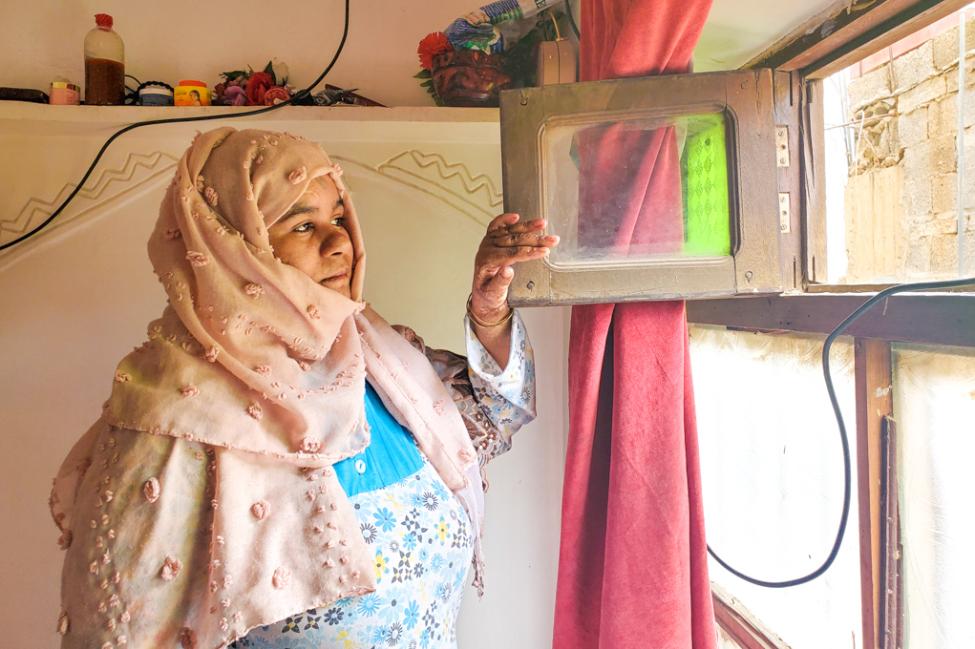-
Who We Are
WHO WE AREIOM is the leading inter-governmental organization promoting humane and orderly migration for the benefit of all, with presence in over 100 countries. IOM has had a presence in Yemen since 1994.
About
About
IOM Global
IOM Global
-
Our Work
Our WorkAs the leading inter-governmental organization promoting humane and orderly migration, IOM plays a key role to support the achievement of the 2030 Agenda through different areas of intervention that connect both humanitarian assistance and sustainable development. Throughout Yemen, IOM supports vulnerable groups including displaced people, conflict affected communities and migrants.
Cross-cutting (Global)
Cross-cutting (Global)
- Data and Resources
- Take Action
- 2030 Agenda
Sana’a – Abeba*, a 27-year-old Ethiopian migrant, used to make a modest living selling vegetables. When she heard from her neighbours that other people from her community were making higher incomes in the Kingdom of Saudi Arabia (KSA), she decided to depart from home with dreams of earning enough to buy a house for her family.
Tens of thousands of migrants travel from the Horn of Africa, mainly Ethiopia and Somalia, to Yemen each year. Most migrants take this journey to escape destitution and hope to find better economic opportunities in Gulf countries, mainly KSA.
Their journeys are facilitated by smuggling networks who convince migrants they are just a few steps away from a better life. Instead, they are met with extreme hardship and violence on their journeys.
“At the beach in Somalia, smugglers crammed us into unseaworthy boats that took us across the Gulf of Aden to conflict-affected Yemen. There were nearly a hundred people on the boat. In the middle of the sea, we had to take the water out with our hands to avoid drowning,” recalled Abeba.
Abeba was one of the few who made it to shore alive. She managed to come up with the additional money smugglers asked her for to make her way to Sa’dah, a city on the border of Yemen and KSA.
There, she stayed with her sister who was living there while she waited to travel onward. One day, a missile hit their house and her life was changed forever.
Abeba lost her sister in the attack. Her own injuries put her in a coma in the hospital for many months. A relative brought her from Sa’dah to Sana’a and did his best to take care of her needs.
He quickly realized he could not care for her alone and came to the International Organization for Migration (IOM) for help. IOM’s health team received her at a hospital in Sana’a and covered the cost of her treatment in the hospital.
The Organization later secured a safe place for Abeba to stay in a home in Sana’a where she received additional medical treatment and psychological support.
“I lost my sister on this journey, and I was burned and wounded in this attack. My journey has been terrible, and I want to go home,” said Abeba.
From the onset of this journey, migrants are prone to risks such as starvation, drowning, violence and exploitation at the hands of smugglers and traffickers.
Like Abeba, Etenesh left Ethiopia in pursuit of a better life, but was abused and exploited on her journey.
“I was beaten by smugglers in Djibouti when I could not pay them. Another smuggler then offered to pay for my trip if I married him,” explained Etenesh, an 18-year-old Ethiopian woman.
“Once we reached Yemeni shores, I was already pregnant. My husband left me without food or money. I walked for weeks to reach northern Yemen.”
In her third month of pregnancy, Etenesh changed her mind and decided to turn around and head back south to Sana’a.
"In Sana’a, I lived with people in the Oromo community. I couldn't work because of my pregnancy and no one accepted me. The last woman I stayed with helped me give birth, but she did not have enough money to care for me after, so she took me to IOM,” continued Etenesh.
“I couldn’t tell my family that I got married. I just sent them my daughter's photo. My father called me and cried. He blamed himself that he couldn’t provide me with the money I needed when I needed it.”
Abeba and Etenesh both decided they wanted to go home and were able to return to Ethiopia on an IOM Voluntary Humanitarian Return (VHR) flight from Sana’a in October.
Thousands of other migrants in Yemen remain stranded in major hubs of Aden, Ma’rib, Sana’a and Sa’dah. Many of them sleep on the streets and struggle to secure the food and water necessary for their survival.
IOM-supported facilities in Aden and Sana’a help stranded migrants with nowhere to go – giving them a safe roof over their heads, daily meals, medical care, psychosocial support and information on safe migration.
The centers that hosted Abeba and Etenesh are funded by the European Union, US State Department’s Bureau of Population, Refugees and Migration (PRM) and the King Salman Humanitarian Aid and Relief Centre (KSrelief) while IOM’s health response to migrants is supported by the Governments of Germany and Finland.
IOM’s VHR assistance to migrants who wish to go home is supported with funding from PRM and KSR.
“I am very happy to return to my country. My life will improve now. I will warn all those who plan to come here because I do not want anyone to experience the harsh reality that I have been through.” Abeba added.
IOM's support will continue after migrants arrive back home in Ethiopia. All returnees will be accommodated at the IOM Transit Centre in Addis Ababa, where further medical, psychiatric and psychosocial support will be given to those in need.
Since the beginning of 2022, IOM has recorded more than 67,500 migrant arrivals in Yemen.
* Names were changed.


